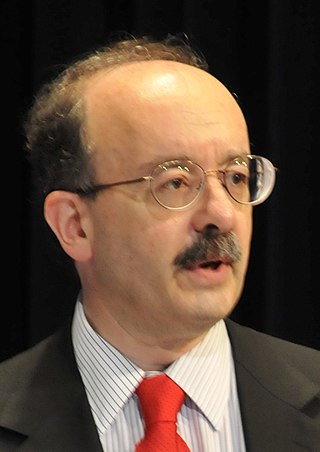
A hydrogen vehicle is a vehicle that uses hydrogen fuel for motive power. Hydrogen vehicles include road vehicles, rail vehicles and hydrogen-fueled space rockets, as well as hydrogen-powered ships and aircraft. Motive power is generated by converting the chemical energy of hydrogen to mechanical energy, either by reacting hydrogen with oxygen in a fuel cell to power electric motors or, less commonly, by hydrogen internal combustion.

Amory Bloch Lovins is an American writer, physicist, and former chairman/chief scientist of the Rocky Mountain Institute. He has written on energy policy and related areas for four decades, and served on the US National Petroleum Council, an oil industry lobbying group, from 2011 to 2018.

Energy development is the field of activities focused on obtaining sources of energy from natural resources. These activities include the production of renewable, nuclear, and fossil fuel derived sources of energy, and for the recovery and reuse of energy that would otherwise be wasted. Energy conservation and efficiency measures reduce the demand for energy development, and can have benefits to society with improvements to environmental issues.

The Rocky Mountain Institute, commonly abbreviated to RMI, is an organization in the United States co-founded by Amory Lovins dedicated to research, publication, consulting, and lecturing in the field of sustainability, with a focus on profitable innovations for energy and resource efficiency. RMI was established in 1982 and has grown into a broad-based institution with over 600 staff and an annual budget of $120+ million. RMI's work is independent and non-adversarial, with an emphasis on market-based solutions.

In 1976, energy policy analyst Amory Lovins coined the term soft energy path to describe an alternative future where energy efficiency and appropriate renewable energy sources steadily replace a centralized energy system based on fossil and nuclear fuels.
Feebate is a portmanteau of "fee" and "rebate". A feebate program is a self-financing system of fees and rebates that are used to shift the costs of externalities produced by the private expropriation, fraudulent abstraction, or outright destruction of public goods onto those market actors responsible. Originally coined in the 1970s by Arthur H. Rosenfeld, feebate programs have typically been used to shift buying habits in the transportation and energy sectors.

The energy industry is the totality of all of the industries involved in the production and sale of energy, including fuel extraction, manufacturing, refining and distribution. Modern society consumes large amounts of fuel, and the energy industry is a crucial part of the infrastructure and maintenance of society in almost all countries.

Negawatt power is investment to reduce electricity consumption rather than investing to increase supply capacity. In this way investing in negawatts can be considered as an alternative to a new power station and the costs and environmental concerns can be compared.

L. Hunter Lovins is an American environmentalist, author, sustainable development proponent, co-founder of Rocky Mountain Institute, and president of the nonprofit organization Natural Capitalism Solutions.
The Hypercar is a design concept car developed by energy analyst Amory Lovins at the Rocky Mountain Institute. This vehicle would have ultra-light construction with an aerodynamic body using advanced composite materials, low-drag design, and hybrid drive. Designers of the Hypercar claim that it would achieve a three- to five-fold improvement in fuel economy, equal or better performance, safety, amenity, and, compared with today's cars.
Renewable Fuels are fuels produced from renewable resources. Examples include: biofuels, Hydrogen fuel, and fully synthetic fuel produced from ambient carbon dioxide and water. This is in contrast to non-renewable fuels such as natural gas, LPG (propane), petroleum and other fossil fuels and nuclear energy. Renewable fuels can include fuels that are synthesized from renewable energy sources, such as wind and solar. Renewable fuels have gained in popularity due to their sustainability, low contributions to the carbon cycle, and in some cases lower amounts of greenhouse gases. The geo-political ramifications of these fuels are also of interest, particularly to industrialized economies which desire independence from Middle Eastern oil.

In 2005 the government of Sweden appointed a commission to draw up a comprehensive programme to reduce Sweden's dependence on petroleum, natural gas and other 'fossil raw materials' by 2020. In June 2006 the commission issued its report, entitled Making Sweden an Oil-Free Society. The report cited four reasons to reduce oil dependence:

Soft energy technologies may be seen as appropriate renewable technologies. Soft energy technologies are not simply renewable energy technologies, as there are many renewable energy technologies which are not regarded as "soft". The character string including "Soft Energy" is a registered trademark of Soft Energy Controls Inc. in Japan.

Brittle Power: Energy Strategy for National Security is a 1982 book by Amory B. Lovins and L. Hunter Lovins, prepared originally as a Pentagon study and re-released in 2001 following the September 11 attacks. The book argues that the U.S. domestic energy infrastructure is very vulnerable to disruption, whether by accident or malice, often even more so than US technology is vulnerable to disruption of the imported oil supply. According to the authors, a resilient energy system is feasible, costs less, works better, and is favoured in the market, but is rejected by U.S. policy. In the preface to the 2001 edition, Lovins explains that these themes are still very current.
The environmental benefits of renewable energy technologies are widely recognised, but the contribution that they can make to energy security is less well known. Renewable technologies can enhance energy security in electricity generation, heat supply, and transportation.

Kyle Datta, named to the Puerto Rico Electric Power Authority Transformation Advisory Council. The Puerto Rico Electric Power Authority (PREPA) announced the names of 11 utility industry leaders who will serve as founding members of PREPA's Transformation Advisory Council (TAC). The TAC was formed to provide PREPA's Governing Board and management team with advice on the development of a long-term vision and transformation execution plan for the power system in Puerto Rico. the TAC consist of recognized executive leaders from the public power and investor owned utility sector and from select non-governmental organizations. Collectively, the TAC members are experts in grid reliability and resilience, corporate restructuring, sustainability, island grids, public power, customer engagement, evolving regulatory frameworks for distributed energy resources, and the utility of the future. Mr. Datta has overseen the development of PREPA's most recent IRP which was released in draft form and calls for 2,000 MW of Solar PV and 1,000 MW of Battery Energy Storage along with a groundbreaking mini grid design to create a resilient energy system.

Energy laws govern the use and taxation of energy, both renewable and non-renewable. These laws are the primary authorities related to energy. In contrast, energy policy refers to the policy and politics of energy.
Fiberforge was a privately held company, started in 1998. The company uses a proprietary process for making thermoplastic advanced composites to make things more lightweight. Particular interest has been placed on decreasing weight of everyday means of transportation like cars and aircraft for better fuel efficiency and hence Environmental sustainability. Amory Lovins was its chairman emeritus.
The Petroleum Conservation Research Association (PCRA) is an organization established in India in 1978, under the aegis of the Ministry of Petroleum and Natural Gas of Government of India that is engaged in promoting energy efficiency in various sectors of the economy. It helps the government in proposing policies and strategies aimed at India's dependency on oil, in order to save money, reduce the environmental impact of oil use and also conserve fossil fuel.

Reinventing Fire: Bold Business Solutions for the New Energy Era is a 2011 book, by Amory B. Lovins and the Rocky Mountain Institute, that explores converting the United States to almost total reliance on renewable energy sources, such as solar energy and wind power. Lovins says that renewable energy is already cheaper than fossil fuels and his analysis predicts further reductions in renewable energy prices.













